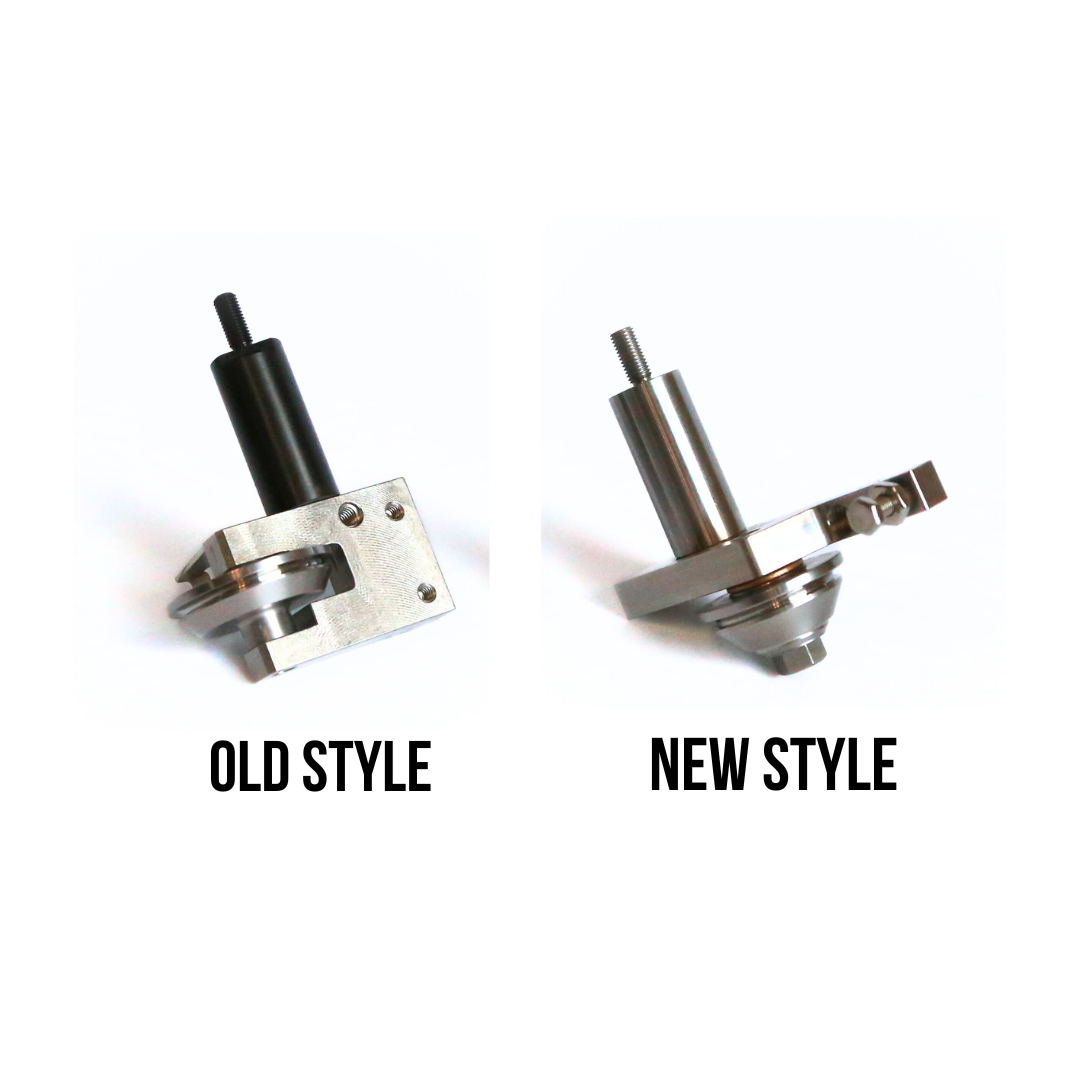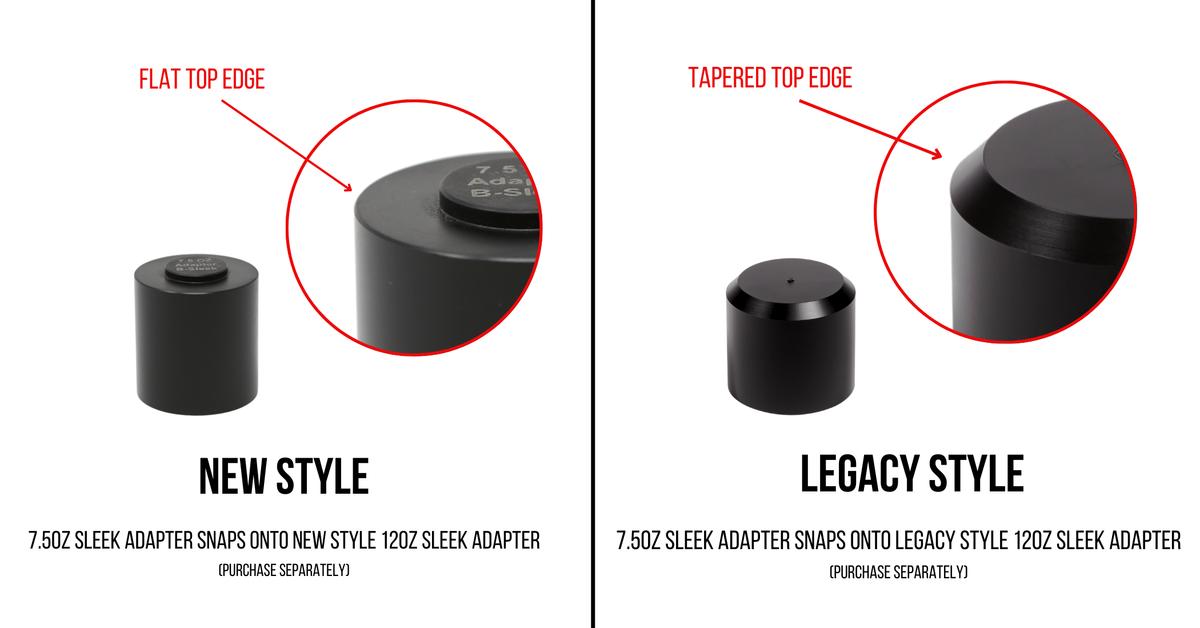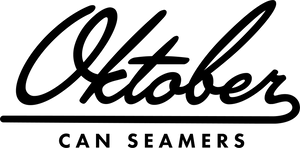F.A.Q.
Categories
How many cans per minute can I do?
Check out our video where we answer just that!
What color options are available for can seamers?
Model 7 and Model 8: Available in so many colors that you might get decision paralysis. Pick your favorite here! We can even wrap your machine in custom designs, logos, or that artistic masterpiece your kid made.
BenchMK and SL1: These are available in any color you want, as long as that color is black.
Why can’t I seam all can sizes with one machine?
Each can size requires specific tooling and components to ensure a proper seal. Differences in can dimensions and seaming specifications make it necessary to swap out tooling and/or adapters. While the Model 8 Can Seamer can accommodate multiple sizes with interchangeable tooling, no single setup can handle all sizes simultaneously.
Why didn't my can seamer come with a manual?
Your seamer box includes a card with QR codes that lead to the digital operation manual and handy how-to videos.
Still craving that old-school hard copy? You can also find them on our website to print—no QR code required. Machines shipped Internationally will come with a hardcopy.
How do I change my tooling?
Tooling changes take a few minutes. Check calibration after retooling.
How often should I recalibrate my can seamer?
Seams should be inspected every few thousand cans, or if issues arise. This is a sign you may need to recalibrate your machine.
How often should I be doing maintenance and cleaning my machine?
Wipe down/clean: Every session of use
Clean/grease lower shaft: Once per day of use
Clean/grease bearing and wave spring: Once per week of use
Clean/grease rollers: Every 500 cans or so.
Do you still carry MK service parts?
We carry select MK replacement parts. Contact us to get a order started, but keep in mind we have a trade up program so you can upgrade.
How do I know if I have a Model 7 or Model 7+?
Model 7 got an upgrade in early 2024, so if your machine predates that, it is a Model 7. If you purchased it new after Feb. 2024, it is most likely a Model 7+. Check out the Model 7 Can Seamer Tooling Upgrade Kit to convert your Model 7 to the new tooling style used on Model 7+ and Model 8 Can Seamers for fast tooling changes.

How do I know which style adapter I need?
Starting in 2023 can seamers received the new design of our can adapters. To determine which is correct for your machine note the chamfered top edge of the original design vs. the "square" top edge of the new design. Depending on model, some machines still shipped with the original design through 2024, so make sure to verify which style you need before ordering.

What is the warranty on new machines?
We provide a 1-year warranty on all new machines. Beyond the warranty period, we’re here to support you with purchasable wear parts and ongoing technical assistance.
Cans
What do I need to seam clear cans with my machine?
To seam clear cans on your Oktober Model 7+ or Model 8Can Seamer, you will need Clear Can Adapter Kit.
Will your cans work with my seamer, even if it’s not an Oktober?
Yes, our cans will work with your seamer as long as you have the correct can-size tooling and adapter for your machine. Our cans are made in industry-standard sizes, ensuring compatibility with most seamers on the market.
Do I need to sanitize before filling my cans?
Cans should ALWAYS be properly sanitized before filling.
1. Start with Clean Cans: Visually inspect for dust, debris, or defects. If cans were stored unprotected, give them a rinse with clean water first.
2. Sanitize Using a No-Rinse Food-Grade Sanitizer
The most common sanitizers used:
- Star San (acid-based, no-rinse)
- Peracetic Acid (PAA) (commonly used in commercial settings)
- Iodophor (iodine-based, no-rinse)
Recommended Method:
- Dilute sanitizer per instructions (e.g., Star San: 1 oz per 5 gallons of water).
- Fill a spray bottle or use a can rinser/sanitizing tunnel.
- Apply sanitizer:
- Spray the interior of each can thoroughly.
- Allow to air dry for 1+ minute and do not wipe or rinse.
3. Best Practices
- Don't use bleach! It leaves residues and can cause corrosion.
- Don’t rinse after applying no-rinse sanitizer. It defeats the purpose.
- Don’t stack wet cans! You’ll risk microbial growth or moisture damage.
- Only sanitize cans immediately before filling.
- Optionally, sanitize the can ends/lids as well.
- Minimize time between sanitizing and seaming to avoid exposure.
- If you’re scaling up, consider:
- In-line can rinsers with air knives or sanitizer jets.
- UV light tunnels for additional sterilization.
Nitrogen purging immediately before filling to reduce oxygen and contamination.
Can your cans be used for retort and pasteurization methods?
Our aluminum cans can be safely used for bath pasteurization, but they are not rated for full retort. Retort cans are specially manufactured for that process and are only available to us in 16oz size, with a minimum order quantity of a full pallet or more through our supplier.
Our clear PET cans are not recommended for any heat applications, including pasteurization or retort.
Can I use non-Oktober cans?
We recommend using Oktober approved cans (Crown, Ball, etc. or tested-compatible cans. We are happy to test your cans.
While our seamers are engineered for industry-standard cans and ends, we cannot guarantee seal integrity with third-party cans that have unknown tolerances.
We do not recommend PET cans from third parties overseas. We have found these to be inconsistent batch to batch.
What is the difference between end types?
There are several end types, including B64, SuperEnds, and CDL. While each profile is similar, and can be considered to perform equally, they each require separate upper chucks. Choosing which end type is as simple as determining which type your can/end supplier has available. If purchasing cans through Oktober, our standard end type is the B64. If you are sourcing cans from another vendor, ask them which ends that provide (202 LOE is NOT enough information). Watch the video all about end types HERE.

Why is the inside of my 16oz can tinted?
All of our aluminum beverage cans are lined with BPANI Gen 2 can liners. There is a tint to the liner. It is to give a visual indicator to that the liner is present and and will have variation in color. They are advanced, BPA-non-intent (BPA-NI) internal coatings developed for aluminum beverage cans. They serve as a safer alternative to traditional epoxy liners containing bisphenol A (BPA), which has raised health concerns. Gen 2 liners are designed to provide robust protection against corrosion and preserve beverage quality, making them suitable for a wide range of drinks, including acidic and sensitive formulations. Learn more here.
Are your cans recyclable?
Yes, all of our beverage cans, coffee cans, and ends are 100% recyclable! Aluminum is one of the most sustainable materials, as it can be recycled indefinitely without losing quality. Our clear cans, clear plastic 401 lids, and steel 401 lids are also recyclable.
Are your cans lined?
Yes, all of our aluminum beverage cans are lined with BPANI Gen 2 can liners. There is a tint to the liner. It is to give a visual indicator to that the liner is present and and will have variation in color. They are advanced, BPA-non-intent (BPA-NI) internal coatings developed for aluminum beverage cans. They serve as a safer alternative to traditional epoxy liners containing bisphenol A (BPA), which has raised health concerns. Gen 2 liners are designed to provide robust protection against corrosion and preserve beverage quality, making them suitable for a wide range of drinks, including acidic and sensitive formulations. Learn more here.
Will you send me can samples?
We provide can samples for free by request and charge for shipping to your location. To request a sample package, email us.
How long will a canned beverage last on the shelf?
Test. Your. Product.
There are way too many variables that go into a canned beverage to be able to “calculate” its shelf life, but there are a few things you can do to maximize it. CO₂ purging, leaving little to no headspace, bottom-filling, and seaming as cold as possible, will all help eliminate potential oxygen in the can. We recommend testing a single batch at different time intervals to help gauge your own specific process.
What can I put in cans?
Craft Beverages are just the obvious answer. We have customers who can dog treats, candles, coffee, nuts, cannabis flower, and bullets. Let us know what you come up with.
How do I cancel or change my subscription?
Follow the link in your email confirmation to change your subscription, or email us at info@oktoberdesign.com.
Are the coffee cans lined for wet food?
Our steel cans are not lined for wet food, but Container Supply offers various solutions for packaging those items.
Do you sell pallets of cans?
Sure do. Get a quote here.
Do you offer discounts for large orders?
You'll see the most significant savings by purchasing pallets or half pallets of brite or labeled cans. For orders of 12+ boxes of cans, we pass on a shipping discount, which varies by can/box size.
Trouble Shooting
I have an issue. What do I do first?
We're happy to help, but you can find the answers to most common issues in the operation manuals, or in one of our videos. Check them out here!
Why have my cans started leaking?
This can happen if your wavespring breaks or goes missing.
For Model 7 Users: Make sure you are doing Operation 1, then Operation 2, and never doing 1 after 2, or both at the same time. One other common cause of leaking cans is a lack of base-force. (upward clamping pressure)
Video: Leaking Cans
My machine is crushing cans- why?
Why are there aluminum shavings on can after seaming?
“Wooling” is a can seaming defect caused by the first operation roller being too high. Also, check to make sure both your rollers are spinning freely. If either are seized, they can cause shavings to appear.
Video: Maintaining Rollers
Why is the seam now really sharp?
Check the vertical alignment of your rollers.
Can I order replacement parts?
Yes. Common parts available on our website. If you don't see what you need online, give us a call.
How do I get the rest of the handle threads out of the roller assembly?
We threaded the lever hole all of the way through. On the Model 7, you will need to remove the sheet metal stop bracket to expose the other side. You can then use the slow, steady pressure of a 1/8th in. drill bit to spin them the rest of the way through and out the other side (you won’t actually drill into the steel).
How do I remove the roller wheel?
We now have a special tool that allows you to press the pins out and back in.
Link to tool.
How do I get my roller unstuck/unseized?
Residue from beer and other bevies can build up on the roller over time. In addition to wiping down with a warm wet rag every day, you can periodically drop the roller assembly out to soak in hot water with a pinch of dish soap.
If residue has ingressed too far to the center of the roller, we now have a special tool to be able to clean and lubricate at the center of the wheel.
Why does my non-carbonated can feel squishy?
Filling and sealing as full and as cold as possible can help non-carbonated beverages from feeling “squishy” in the can after being sealed. Other methods like nitrogen dosing before seaming are common in the packaging industry. Check out our Liquid Hydrogen Kits.
Why haven't I gotten a call back yet?
We do our best to answer the phone 10am-5pm EDT during weekdays. If you leave a voicemail, we'll return your call. You can also email us at info@oktoberdesign.com. Our customer service team is small, but mighty and is probably on the other line helping someone out.
Why does the guy who answers the phone sound so handsome?
See for yourself on our new Oktober Labs series.
Orders & Returns
Can you ship outside the United States?
Oktober Can Seamers ships almost anywhere in the world. If you need help placing an order, contact us.
Please note duties and taxes are not included.
We also have reseller partners in Mexico, Australia, Italy, Norway, and the Philippines. Learn more here.
What's the best way to order?
If you’re unsure about your needs, feel free to reach out, and we’ll work with you to create an order that’s tailored to you.
For the easiest and fastest experience, especially if you know what you need, order online. This is particularly helpful for reordering custom-labeled cans, as it ensures accuracy and swift processing.
Do you accept ACH payments?
Yes. Please contact us to set up alternative payment arrangements.
How do you ship orders?
We ship all orders via UPS on weekdays, excluding holidays. You’ll receive an email with a tracking number once your order ships. Please allow up to 12 hours for the tracking number to activate. Read the full Shipping Policy HERE.
Can I change the shipping address on my order?
If the wrong shipping address was provided, please contact us with the correct address and order number. We will do our best to reroute the shipment. Additional shipping charges may apply.
Can I use my own shipping labels, charge shipments to my UPS account, or arrange my own freight?
Yes.
If you’d like to authorize Oktober Can Seamers to bill shipments to your UPS account, email us at info@oktoberdesign.com and we’ll send instructions.
If you prefer to arrange your own freight shipping, or if you’d like to send FedEx labels, just email us and we’ll coordinate the details with you.
We’re happy to work with whatever shipping setup makes the most sense for your operation.
Why does it say "shipping not available" to my state?
That's not right- something is not working correctly. Try refreshing your browser, but please let us know about the issue. We're happy to help you place your order.
Can I cancel my order?
If you need to cancel an order, please email your order number to info@oktoberdesign.com as soon as possible.
Standard orders may be cancelled only if they have not yet shipped.
Custom color machines are not eligible for cancellation.
Custom labeled can orders may be cancelled only if the label has not yet entered print production.
Let us know right away and we’ll do our best to accommodate your request!
Why does my tracking number say invalid even though it's existed for 3 whole seconds?
Tracking numbers may take up to a few hours to go live on the carrier’s end after being picked up. Our daily UPS and USPS pick ups are around 4pm EST (may slightly vary from day to day), so please check back in the evening on the day you receive the tracking.
Why is shipping cans so expensive?
Shipping costs are based on volume and density, and cans are high-volume but low-weight, which increases the cost. To help reduce expenses, we’ve partnered with UPS to secure the best possible rates for our customers.
We also offer a discount for shipping 12 or more boxes at a time. Feel free to email us for a custom quote!
Why did I only receive part of my order?
We fulfill orders as products become available and ship from two different fulfillment locations. Don’t worry—the rest of your order is on its way! You’ll receive a tracking number as soon as it ships.
Do I need a liftgate for delivery? How do I know?
Can Pallets and the Oktober Canning Line ship on pallets and are delivered by a freight truck. If a semi truck shows up, how does a 300–500 lb pallet get off the truck? If the answer isn’t “forklift” or “dock,” you’ll need a liftgate.
What should I do if my shipment is damaged?
If your box or product is damaged during shipping, email us at info@oktoberdesign.com with your order number and photos of the damage within 5 business days. We’ll file a claim with UPS and work to resolve the issue. Read the full Shipping & Return Policy HERE.
Why can't I return cans?
Aluminum, PET, and steel cans are not eligible for return due to health and safety considerations.
How do I initiate a return?
To start a return, email us at info@oktoberdesign.com with your order number and the reason for the return. We’ll provide instructions on how to proceed. Please note, returns sent without prior approval will not be accepted. Customers are responsible for return shipping.
Read the full Return Policy HERE.
When will I get my refund?
Please allow up to 10 business days for your refund to be processed. You will be notified via email when we initiate the refund.
Trade Up Program
How does the trade up program work?
Read all about it here!
Which machines are accepted for trade up credit?
Eligible for Trade In Credit:
- Oktober SL1 Can Seamer
- Oktober MK Series Can Seamer (discontinued)
- Oktober Model 7 Can Seamer
- Maybe whatever else you got. Can't hurt to ask, right?
Trade in credit is valid for purchases of the Oktober Model 7 Can Seamer and Oktober Model 8 Automatic Can Seamer only.
When will I get my trade up credit?
When your new Can Seamer arrives, use the box and pre-paid shipping label to send us your old machine.
We'll refund you the trade up value of your old machine when receive it. You'll receive an email confirmation notifying you of the refund. Please allow up to 10 business days for processing a refund on your order.
Can I purchase a refurbished can seamer?
We do not currently have a program for refurbished can seamers. If you are interested in being notified if a program becomes available, email us.
Can I get cash for my old can seamer instead?
We do not currently offer a buyback program. If you have questions about selling your machine, feel free to reach out for assistance.
Custom Labeled Cans
Can I get a sample of my custom can label?
Yes, sample press proofs are available and typically ship within 3 weeks of digital proof approval. Press proofs are printed on a material sheet and do not come on a can.
What design guidelines are there?
Guidelines specific for each can size are available on the corresponding product page, along with free Canva templates. You may use any design program as long as artwork meets the accepted format and quality specifications. Artwork dimensions must be exact for chosen can size; you cannot reuse artwork across different can sizes without resizing. More info here.
What file formats are accepted?
Preferred formats: PDF or AI with 300–800 dpi resolution, in CMYK, with outlined fonts and embedded images.
For the PDF option, you upload directly via the online ordering system.
For AI files, email to labels@oktoberdesign.com with your order number.
Use high-resolution logos; PDF files should be print-ready (flattened, CMYK format). More info here.
What color profile is used, and why does it matter?
Colors can print differently than they appear on screen if no color profile is embedded. We recommend creating all print-intended designs in CMYK using the GRACoL ICC profile download here for best results.
For accurate color matching, please provide Pantone codes using the Pantone Color Finder. It is the customer’s responsibility to ensure their submitted file meets the provided specs and contains the correct information to achieve the best print quality. Oktober is not responsible for color differences if a profile is missing or Pantone codes are not specified.
More info here.
How do digital proofs work?
Digital proofs are provided for new artwork via email. Proofs must be reviewed and approved within 48 hours to avoid delays.
Once approved, orders go into production and cannot be changed.
if you use artwork that's already on file, no proof is required. Email labels@oktoberdesign.com to update or check your artwork.
Check out our guide here about how to read digital proofs.
More info here.
What legal information must my label include?
Ensure your design complies with all local, state, and federal regulations applicable to your product. For alcoholic beverages, include the latest Surgeon General’s warning.
More info here.
Are labels waterproof?
BOPP (Biaxially Oriented Polypropylene) labels, which are durable, water-resistant, and UV-resistant.
Store cans/labels in a dark, dry place at 72°F (approximately 22°C) with 50% relative humidity.
Avoid extreme temperatures: Heat can soften adhesives. Cold can reduce adhesion.
More info here.
What is the turn around time on labeled cans?
Labeled cans take about 3-4 weeks from final artwork approval.
Can you help me design my label?
We offer limited design services for a fee. Email us your ideas at labels@oktoberdesign.com.
MISC
Will you sponsor my homebrew club event?
Looking to have your homebrew club event, festival, or competition sponsored? We love supporting the craft beer community and are happy to consider sponsorship and donation requests! Fill out this form and we’ll review your request. While we can’t accommodate every request, we do our best to support as many events as possible.
You guys sound fun. Can I visit?
We love visitors at our Grand Rapids, Michigan shop! Drop us a line, or swing by anytime to check out the operation.

